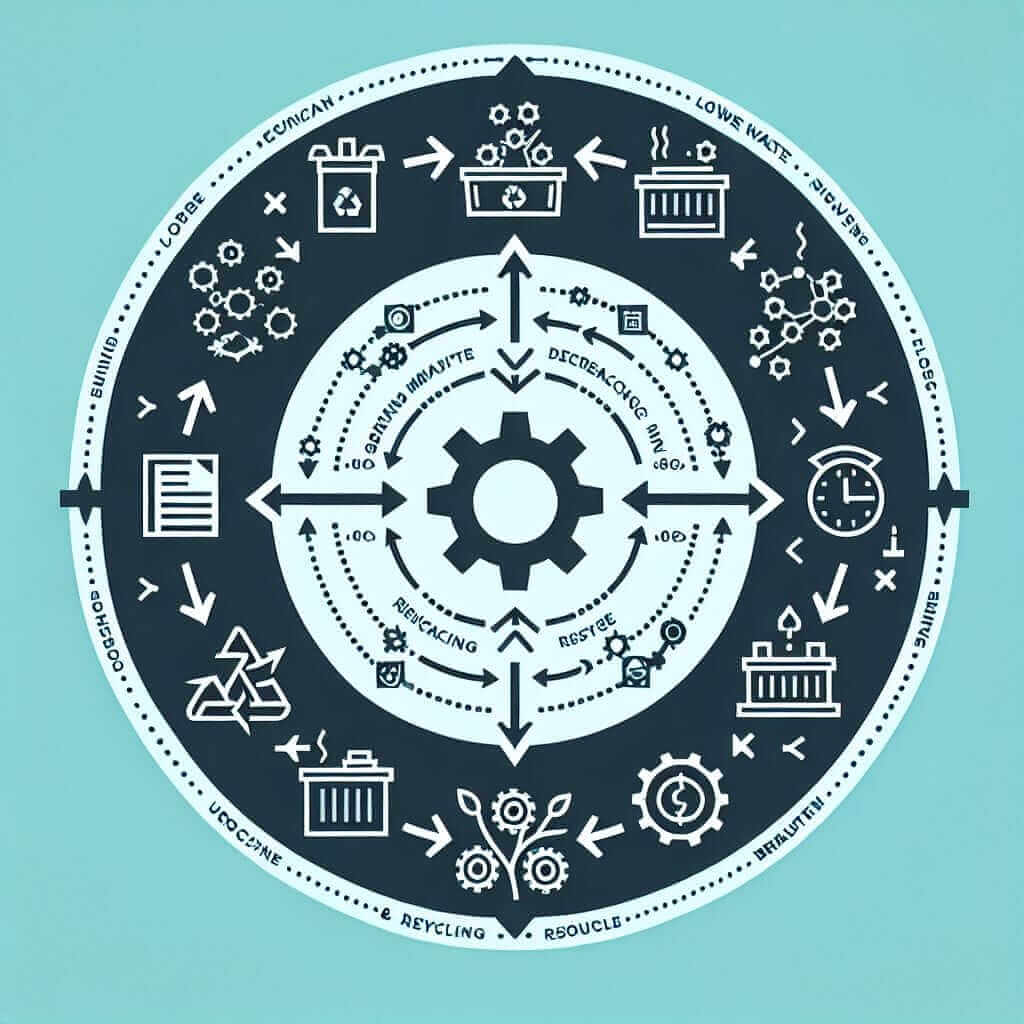The Reading section of the IELTS exam evaluates your ability to understand reading passages and to extract and use information effectively. One prevalent topic that might appear in the IELTS Reading test is the influence of the circular economy on global manufacturing processes, a subject increasingly significant in contemporary discourse due to ecological and economic concerns. This topic has historically appeared in various forms and is likely to recur owing to its relevance and the growing global interest in sustainable practices.
In this article, we delve into the specifics of how the circular economy affects global manufacturing processes, providing a sample IELTS Reading question, detailed analysis, and useful study tips. This will aid IELTS candidates in preparing effectively for this potentially challenging topic.
Sample IELTS Reading Test
Passage: The Circular Economy and Its Impact on Global Manufacturing
The circular economy is a systemic approach to economic development designed to benefit businesses, society, and the environment. Unlike the traditional linear economy, which follows a ‘take-make-dispose’ model, the circular economy is regenerative by design and aims to gradually decouple growth from the consumption of finite resources.
Paragraph 1
The shift towards a circular economy is accelerating globally, driven by economic, ecological, and regulatory pressures. Companies in various industries are rethinking their business models to incorporate circular principles into their supply chains to remain competitive and ensure long-term sustainability. This transition involves designing products for longevity, reusability, and recyclability, thereby reducing waste and conserving natural resources.
Paragraph 2
In the global manufacturing sector, adopting circular economy practices entails significant changes. Manufacturers are increasingly using secondary raw materials recovered from end-of-life products and industrial by-products, which reduces the need for virgin materials. This shift not only alleviates the strain on natural resources but also leads to substantial cost savings, thereby improving economic resilience.
Paragraph 3
Moreover, the circular economy fosters innovation through the development of new materials, reformulation of production processes, and creation of novel business models such as product-as-a-service (PaaS). Companies providing PaaS retain ownership of products and are incentivized to extend their lifespan through maintenance, refurbishment, and upgrading, hence offering high-quality services and goods while minimizing potential landfill waste.
Paragraph 4
Despite these benefits, the implementation of circular economy principles faces challenges, particularly in developing standardized metrics to measure circularity and gaining stakeholder buy-in across the supply chain. Companies must also navigate regulatory landscapes that may not yet fully support or incentivize circular practices. Nevertheless, as the global community increasingly recognizes the necessity of sustainable practices, the circular economy is poised to transform the manufacturing landscape profoundly.

Sample Questions
Question Type: Multiple Choice
-
What is one of the primary drivers for companies to integrate circular economy principles?
a) Increased product pricing
b) Ecological pressures
c) Availability of natural resources
d) Consumer demand for disposable goods -
What innovation does the circular economy particularly encourage in manufacturing?
a) Linear production models
b) Exclusive use of virgin materials
c) Product-as-a-service models
d) Single-use packaging
Question Type: True/False/Not Given
-
The transition to a circular economy completely eliminates the need for natural resources.
-
Developing a circular economy framework in manufacturing faces no regulatory challenges.
Question Type: Matching Information
- Match the following statements with the corresponding paragraphs (1-4):
a) Challenges to implementing a circular economy.
b) The role of secondary raw materials.
c) Importance of product longevity and reusability.
d) Circular economy encourages development of new business models.
Answer Key
- b) Ecological pressures
- c) Product-as-a-service models
- False – The passage mentions that it reduces the need but does not completely eliminate it.
- False – The passage mentions navigating regulatory landscapes as a challenge.
- a) Paragraph 4, b) Paragraph 2, c) Paragraph 1, d) Paragraph 3
Common Mistakes and Tips
Common Mistakes
- Misinterpreting Statements: Ensure you understand what is being asked, particularly in True/False/Not Given questions, as they can be tricky.
- Ignoring Context: Always pay attention to the context in which information is presented. A detail in isolation might lead to incorrect answers.
Tips
- Skim for General Understanding: Quickly skim the passage first to get an idea of the structure and main points.
- Underline Key Points: While reading, underline or highlight key concepts, which can aid in answering detail-oriented questions.
- Practice Regularly: Regular practice with authentic IELTS reading materials will improve your speed and accuracy.
Vocabulary
Difficult Words in the Passage
-
Decouple (verb) – /diːˈkʌpəl/: To separate something from something else.
Example: “The goal is to decouple economic growth from the consumption of finite resources.” -
Longevity (noun) – /lɒnˈdʒɛvɪti/: Long life or long duration of service.
Example: “Products are designed for longevity in the circular economy.” -
Recyclability (noun) – /ˌriːˈsaɪkləbəl/: The ability of a material to be recycled.
Example: “High recyclability reduces waste and conserves resources.” -
Alleviate (verb) – /əˈliːvieɪt/: To make something less severe.
Example: “Using secondary raw materials alleviates the strain on natural resources.”
Grammar to Focus
Relative Clauses: These introduce additional information about something without starting a new sentence.
- Example: “Manufacturers are using secondary raw materials, which reduces the need for virgin materials.”
Passive Voice: Often used in academic writing to emphasize the action or its receiver rather than the subject.
- Example: “Regulatory pressures have accelerated the shift towards a circular economy.”
Conclusion
To excel in the IELTS Reading section, immerse yourself in comprehensive and authentic material. Understanding topics like the circular economy’s impact on global manufacturing can vastly improve your ability to tackle complex passages. Regular practice, familiarizing yourself with diverse question types, and expanding your vocabulary are key strategies to achieve high scores.
Remember, practice makes perfect. Consistently engage with a variety of reading texts and challenges, and you will find yourself well-prepared for any topic the IELTS exam throws your way.